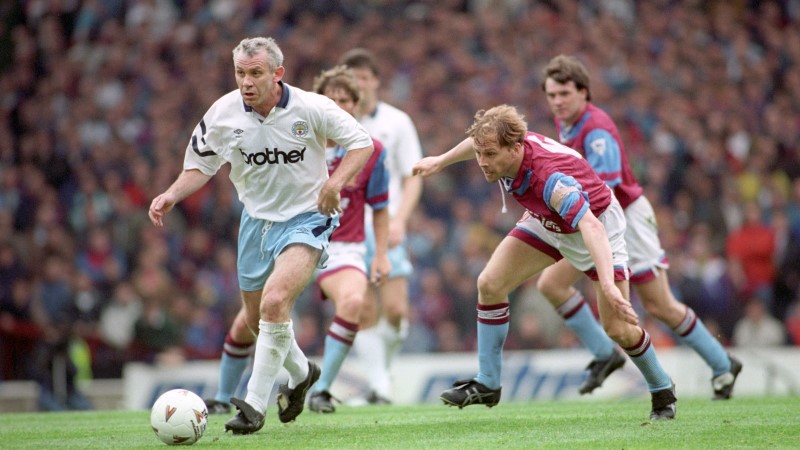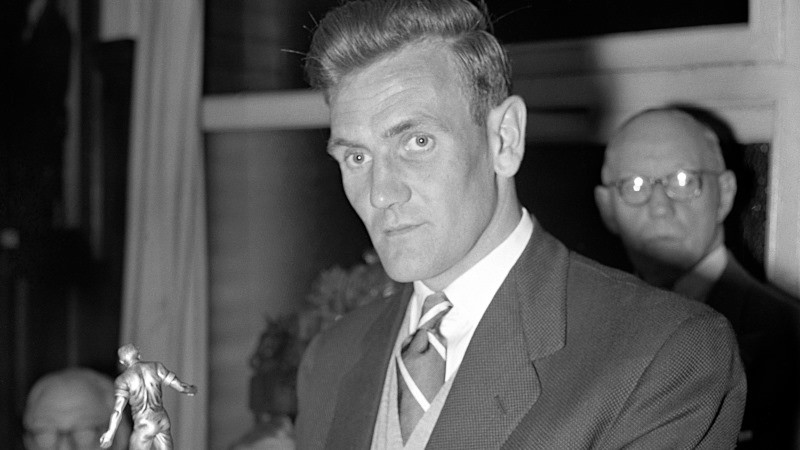Uwe Rosler
Crowd favourite Uwe Rosler – ‘Der Bomber’ – was, ironically, a typically English centre-forward whose bustling energetic style made his £500,000 fee from FC Nurnberg look like peanuts after finishing top scorer in three of four full seasons with the Blues.
Scoring 64 goals in 165 games, his partnership with Paul Walsh was particularly profitable, especially when serviced by a constant stream of inviting crosses by Peter Beagrie.
Winner of the club’s Player of the Year award, he netted four against Notts County that term to become the first City player to score four in an FA Cup clash since Johnny Hart was leading the line in 1953.
Rosler was lethal in the air and went on to win caps for Germany after winning several from East Germany prior to his arrival in England. He returned home after City were relegated to Division Two but failed to repeat the heroics he showed while at Maine Road and later had a spell with Southampton.
Cancer curtailed his playing career early, but he beat the disease and returned to the sport as manager – City fans have cheered on his Brentford and Wigan sides in past seasons, and Rosler is now in charge of Championship outfit Leeds United.
Roundabout
The trip down the M1 from Manchester to Wembley has become well-trodden for City fans in recent years.
Regardless of the plethora of eating and drinking establishments in the local area who enjoy a roaring trade whenever the national stadium is in use, the patch of grass known simply as the roundabout has become one of the City meeting places of choice.
Located opposite the Green Man, the roundabout was first taken at the FA Cup semi final against United in 2011, and ever since then has been a sea of blue shirts whenever City are in town.
Plenty of FA Cup memories will start at the roundabout….
Don Revie
Signed for what was a substantial fee in 1951 – £25,000 – Don Revie’s revolutionised deep-lying centre-forward role saw him named the 1955 FWA Player of the Year and helped City to successive FA Cup finals in 1955 and 1956.
Dubbed the ‘Revie Plan’, it turned confused defences unfamiliar with the new system inside out and he set up a multitude of goals for his teammates, even if it meant he was hardly a prolific goalscorer himself with 41 in 177 games.
It also brought him to the attention of England and he won six full caps. He moved to Sunderland in November 1956 for £24,000 and went on to become player-manager of Leeds United, helping to transform a struggling Second Division team into an excellent side that shone domestically and in Europe, lifting the Division One title on two occasions.
He became England boss but could not repeat his successes at club level and resigned in somewhat controversial circumstances before heading for management in the Middle East.
Peter Reid
Though he may have had his best years elsewhere, notably at Everton and Bolton Wanderers, Peter Reid never gave less than his all for City and the fans loved him for it.
The gutsy midfielder had the natural leadership qualities that City desperately needed during the late 1980s and early 1990s, holding together a young midfield and molding a side headed for relegation into a tight, no-frills outfit.
He arrived on a free transfer from QPR and was immediately installed as player-coach by Howard Kendall. Reid seemed the natural successor to the man who signed him when his boss returned to Goodison Park and he became City’s player-manager by popular demand, guiding them to successive fifth-place finishes in the League.
The likes of Keith Curle and Terry Phelan arrived at Maine Road under Reid’s stewardship, but he departed in 1993 after City slipped to ninth in the first season of the Premier League, while playing an increasingly unattractive brand of football.
Reid has since taken the hotseat at Sunderland, Leeds and Coventry, and is currently plying his trade in the Indian Super League as boss of Mumbai City.

Tweet us with your suggestions for the letter ‘S’ @MCFC...
A is for Aguero, Argentina and Ardwick
B is for Balotelli, Ballet on Ice and Berkovic
C is for Corrigan, Cricket and Curle
D is for Doyle, Dowd and Dzeko
E for Elano, Elvis the Eagle and Eriksson
F is for Flitcroft, Floodlights and Foe
G is for Goater, Gibson, Golden Goal
H is for Hart, Horlock and Huddersfield
I for Immel, Iheanacho and Ireland
J is for Johnstone, James and Jihai
K is for Kinky, Kippax, Keegan and Kennedy
L is for Lake, Lee and Lescott
N is for Nash, Nicknames and North Stand
P is for Play-offs, Pearce and Poznan






